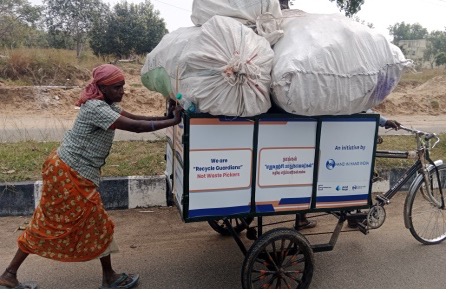Since July 2024, the Grieg Foundation has been supporting CLOCC’s Recycle Guardians initiative in Chengalpattu District, Tamil Nadu. The project aims to mobilize and train 550 informal waste workers, both men and women between the ages of 18 and 60, to transform waste into opportunity. By enhancing economic, social, and environmental conditions, the initiative fosters a more inclusive and sustainable approach to waste management.

Building Skills and Improving Livelihoods
In its first six months, the project has already made a significant impact on the lives of hundreds of waste workers. Participants, known as Recycle Guardians, have received essential training in literacy, numeracy, and waste management, along with safety equipment to improve their working conditions. This initiative is reducing gender and social inequalities while also strengthening environmental protection by preventing waste leakage and increasing the flow of recyclable materials, helping to mitigate marine pollution.
So far, 148 families, benefiting 279 individuals, have been engaged in the project through extensive awareness-building efforts to ensure they fully understand their roles, rights, and responsibilities. As part of this effort, 272 fluorescent green T-shirts with the slogan "We are Recycle Guardians, Not Waste Pickers" were distributed to reinforce their sense of recognition and belonging while also improving visibility and safety during waste collection. In addition, 59 Bora bags were provided to help them organize and manage their work more efficiently.

Enhancing Economic Stability and Well-being
Training has been rolled out across multiple areas, equipping 248 members with basic literacy skills and 198 members with financial literacy training. Another group of 13 participants have received training in behavioral change and health and safety, focusing on decision-making, personal well-being, and workplace safety. By improving their ability to read, write, manage finances, and adopt safer practices, the initiative is helping to enhance their socio-economic stability and overall quality of life.
To further support their work, five pedal tricycles have been provided to families, significantly improving their mobility and efficiency in waste collection. Efforts have also been made to integrate them into the formal sector, with three individuals successfully enrolled in the ABHA card system, granting them access to essential healthcare services, while one individual has received an E-Shram card to benefit from labor welfare programs. (ABHA is a digital identity that provides access to healthcare services across the country.)
Manjula’s Story
Manjula is 52-years-old. Before joining the Recycle Guardians initiative, she and her family walked four kilometers each day, collecting just 10 kilograms of recyclables and earning between 200-300 rupees. The physical strain of carrying heavy loads limited their ability to collect more waste and increase their earnings.
With the introduction of a pedal tricycle, their daily coverage has expanded to 10-15 kilometers, allowing them to collect up to 35 kilograms of recyclables and increase their income to 600-800 rupees. This simple yet transformative intervention has not only eased their physical burden but has also improved their efficiency and financial stability, restoring dignity to their work and demonstrating how targeted support can break the cycle of poverty and create lasting change.
A Sustainable Future for Informal Workers
By addressing both practical and social challenges, the Recycle Guardians initiative is paving the way for a cleaner environment and a better future for informal waste workers and their families in Tamil Nadu. Through continued training, resource support, and integration into formal systems, the initiative is not only improving livelihoods but also contributing to a more sustainable and inclusive waste management system.

.png)




Comments